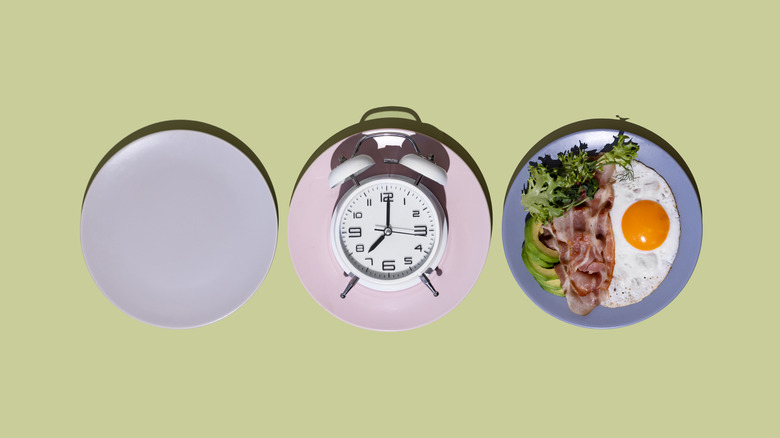Is Fasting Good For Anxiety?
Everyone experiences anxiety sometimes, according to the National Alliance on Mental Illness, and more than 40 million adults have an anxiety disorder. Clearly, anxiety is already common, and it's only becoming more prevalent. In fact, the World Health Organization reported a 25% increase in anxiety and depression globally during the first year of the pandemic.
Though this may sound grim, it also means that people are no longer struggling alone in silence, as discussions about mental health become more commonplace. "Historically, when people have talked about 'mental health', they usually meant severe mental illness," Dr. Mark van Ommeren, a mental health expert with the World Health Organization, explained to NBC News. "Today, 'mental health' can also mean common conditions like anxiety and depression. ...Our awareness is shifting, and mental health is coming out of the shadows."
As awareness of anxiety increases, so might treatment options and interventions. The most common types of treatment include psychotherapy and medications, though other techniques, like meditation and exercise, are also recognized forms of anxiety relief (per Healthline).
Growing evidence now also shows that fasting could be an effective way to manage anxiety.
Mental health benefits of fasting
Fasting is no longer restricted to extreme diets or religious practices. The rise of intermittent fasting has made it a popular way to manage weight and health, according to the BBC News. And limiting eating on certain days or during specific time windows may also offer mental health benefits. In fact, fasting has been found to increase mental clarity and willpower (via WebMD).
Research also finds a link between fasting and anxiety relief. A 2017 study on mice published in Metabolism suggested that a one-day fast could significantly reduce behaviors related to anxiety. A 2021 research review published in Nutrients also found that people who fasted reported lower rates of anxiety and depression. The review argued that intermittent fasting for 12 weeks is safe even for those with diabetes.
Other research, like one 2016 study published in Frontiers in Nutrition, has noted that limiting food consumption through fasting can increase irritability and moodiness. However, they also found that healthy women who fasted experienced an increase in pride, achievement, and a sense of self-control.
Is fasting for anxiety worth it?
While there's some evidence that fasting can improve anxiety and mental health conditions, there's also evidence suggesting the opposite. One 2022 research review published in Disease Markers highlighted previous studies that found a positive correlation between fasting and anxiety. Additionally, skipping meals has been found to trigger anxiety symptoms, according to a 2020 study published in Innovation in Aging.
Besides mixed evidence on the benefits of fasting, there are also some clear drawbacks. According to Healthline, fasting is associated with headaches, trouble sleeping, fatigue, digestive issues, and malnutrition — problems that may only make anxiety harder to manage.
Rather than restricting when to eat, Mayo Clinic suggests focusing on what you eat to help stave off anxiety symptoms. Healthy food choices for anxiety include eating a solid source of protein at breakfast, opting for complex carbs over simple carbs, and limiting caffeine and alcohol.
If intermittent fasting still seems like an attractive choice, talk to a doctor first before making substantial dietary changes. And remember that while fasting may help improve mental health for some people, it typically works best when paired with another treatment, such as psychotherapy.


